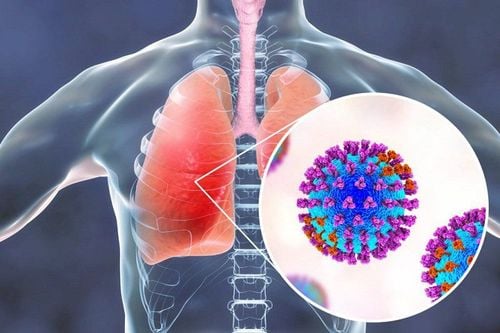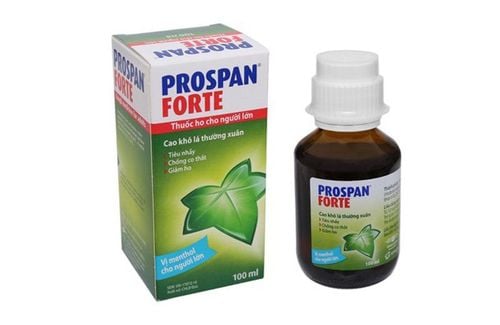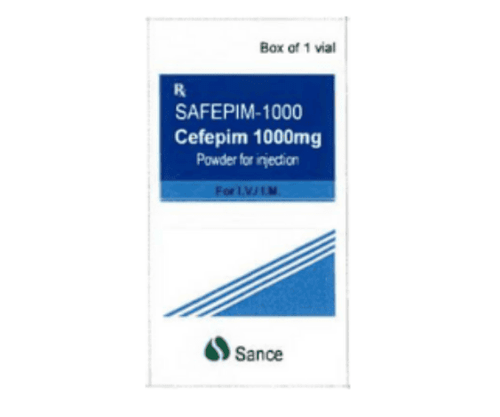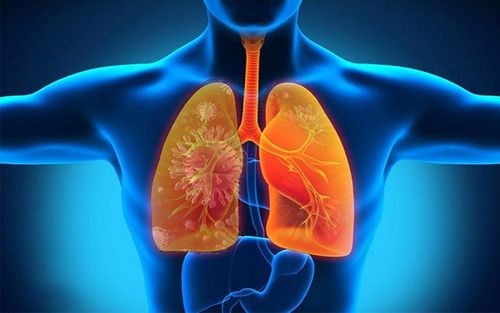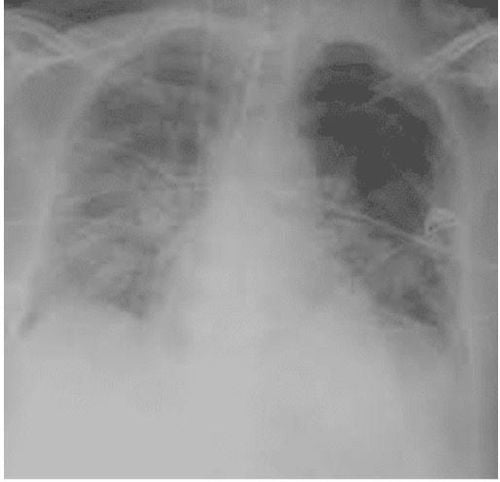This is an automatically translated article.
Posted by Doctor Nguyen Thi Tam - Pediatric Center - Vinmec Times City International General HospitalPneumonia is an infectious disease in the bronchi and lung parenchyma, lesions are often diffuse, scattered in both lungs, causing gas exchange disturbances, causing respiratory failure. Pneumonia in children can be cured if diagnosed early and treated properly, on the contrary, it can easily lead to death if the child is late or not treated properly.
1. Causes of pneumonia in children
Children under 5 years old, especially children under 2 months old are prone to pneumonia and high mortality. There are many causes of pneumonia in children, but they are mainly caused by bacteria and viruses. Some may be caused by parasites, fungi, or aspiration.
Viral pneumonia: accounting for about 70% of pneumonia causes, more common in children < 5 years old, respiratory syncytial virus (RSV), less commonly Influenza virus (A and B), Parainfluenza virus, Adenovirus, Rhinovirus...
Bacterial pneumonia:
Children < 2 months old: commonly group B streptococcus, staphylococcus (Staphylococcus aureus) intestinal Gram-negative bacteria (E. coli, Proteus), Streptococcus pneumoniae, Haemophilus influenzae, sometimes caused by atypical bacteria Chlamydia trachomatis Children 2 months - 5 years old: often S. pneumoniae, H. influenzae, Moraxella catarrhalis Children > 5 years old: S. pneumoniae and H. influenzae, atypical bacteria more common in young children. (Common atypical bacteria are Mycoplasma pneumoniae, Chlamydia pneumoniae, Legionella pneumoniae). Severe and very severe pneumonia is usually caused by staphylococcus or certain Gram-negative bacteria.

Tụ cầu là một trong những nguyên nhân gây viêm phổi nặng ở trẻ em
2. Favorable conditions prone to pneumonia
The younger you are, the more likely you are to get sick and the more severe the disease. Cold weather, changing seasons. Infants born prematurely, born weak, malnourished. Congenital defects, congenital heart... Sanitary conditions, environmental conditions with lots of dust, tobacco smoke, toxic gases, dark and cramped houses... Contagious conditions such as kindergartens, schools , family...
3. Signs of early detection of pneumonia
Initiation:
Children may have symptoms of respiratory infection: runny nose, stuffy nose, dry cough, fever, body aches, skipping play, little feeding, fatigue, fussiness. Children may have digestive disorders such as vomiting, regurgitation, abdominal distension, diarrhea.

Viêm phổi có thể khiến trẻ bị rối loạn tiêu hóa
After a few days:
Respiratory symptoms: Signs of tachypnea are easy to see, count the breaths within one minute when the child is lying still or asleep, the child breathes rapidly when:
Under 2 months breathing ≥ 60 times/minute . From 2 months to 1 year old ≥ 50 times/minute. From 1 year to 5 years old ≥ 40 times/minute. In some cases, children under 2 months or children with severe illness may not breathe fast, but breathe slowly, whine or have pauses in breathing, which is a medical condition that requires immediate emergency treatment
Cough: dry cough at first , after having sputum, young children or weak children sometimes do not cough or cough less.
Other signs: Cyanosis of the mucous membranes, chest indrawing, intercostal muscle contraction, depression on the breastbone, rising and falling of the nostrils, breathing...
Systemic symptoms: The child may have a high fever, hypothermia in young children, vomiting, poor feeding
, fatigue...
4. Treatment of pneumonia in children
Childhood pneumonia, if diagnosed and treated early, usually progresses well and recovers after 7-10 days.
Not all cases of pneumonia require hospital treatment. Mild pneumonia can be treated at home. Clear the airways, eat liquids with small meals to avoid vomiting. Take medicine as directed by your doctor. Monitor and detect serious signs to take the child to the doctor right away.
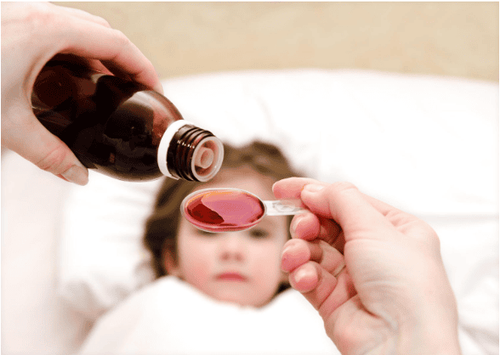
Trẻ bị viêm phổi nhẹ có thể tự điều trị tại nhà theo đơn thuốc của bác sĩ
Children with pneumonia should be hospitalized immediately when: the child has signs of life-threatening danger.
Children under 2 months: Always need to be treated in the hospital for pneumonia The child is breathing fast or deeply indrawing of the chest, or if the child has one of the following signs: moaning, rising and falling nostrils, refusing to feed , vomiting everything, convulsions, lethargy, hard to wake up, fever, hypothermia... is very severe pneumonia. Children from 2 months to 5 years old: Cough or difficulty breathing and one of the above severe signs is present, which means that the child has severe pneumonia or a very serious illness that requires inpatient treatment in the hospital. Treatment of children with severe pneumonia in hospital: General principles of treatment:
Anti-infection: It is necessary to use antibiotics to treat all cases of pneumonia requiring hospitalization. Anti-respiratory failure: open airway, oxygen therapy when SpO2 ≤ 94%, or respiratory rate > 70 breaths/minute, or severe chest indrawing. Treatment of disorders of water, electrolytes, acid-base balance, nutrition. Symptomatic treatment: fever, cough, wheezing Treatment of complications (if any)
5. Caring for children with pneumonia:
Breastfeed the baby, eat enough food, eat a little to prevent the child from vomiting and having difficulty breathing.
Clean and clear the airways with physiological saline drops daily.
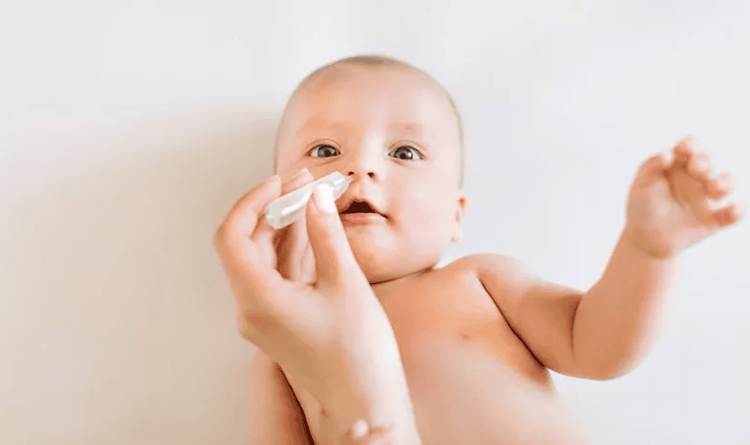
Nhỏ nước muối sinh lý mỗi ngày để thông thoáng đường thở cho trẻ
Keep the baby warm when it's cold, apply a warm compress when it has a fever, and keep your hands clean when caring for your baby to avoid cross-contamination with other bacteria.
Treatment must follow the doctor's prescription, including treatment of the cause, treatment of symptoms and supportive treatment.
Re-examine at any time when the child has signs of general danger or breathing faster, more tired or more seriously ill.
6. Prevention of pneumonia for children
Health care, good pregnancy management for mothers to limit cases of premature birth, low birth weight. Ensure aseptic hygiene during birth and newborn care. Children are breastfed early, eat solid foods, avoid malnutrition. For children to live in a clean environment, free of harmful dust, smoke, tobacco, avoiding toxic gases, pollution, dark, cramped, humid places... Avoiding as much of the source of infection as possible Immunize children with all the necessary precautions. vaccines such as: Flu, parainfluenza, chickenpox, HiB, pneumococcal, measles.... To register for examination and treatment at Vinmec International General Hospital, you can contact the System Hotline Vinmec Healthcare nationwide, or register online HERE.





